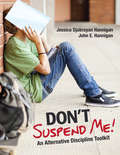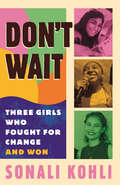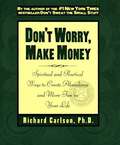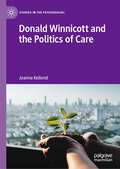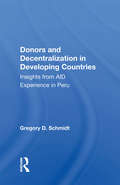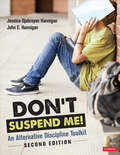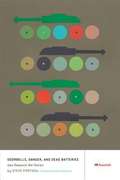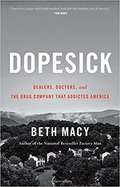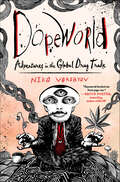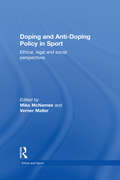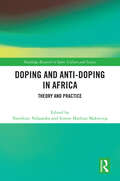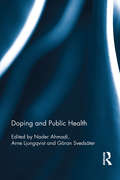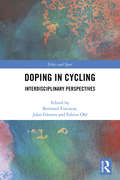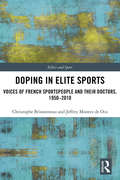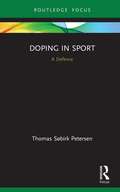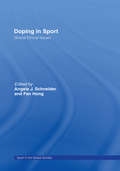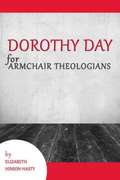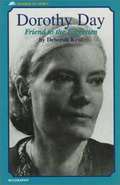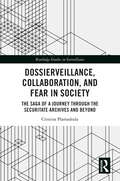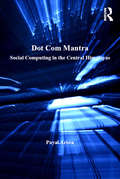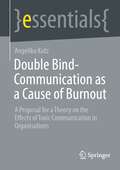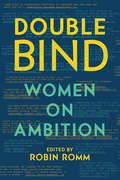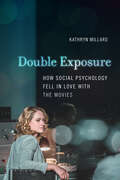- Table View
- List View
Don't Suspend Me!: An Alternative Discipline Toolkit
by Dr Jessica Djabrayan Hannigan John E. HanniganLearn how alternative discipline methods can create long-term change Suspensions don’t work. They don’t improve behavior and they don’t address the social-emotional needs of students. There are better, alternative discipline methods that can create positive, meaningful long-term changes in the behavior of challenging students. Aligned with educational law, Don’t Suspend Me! gives educators the tools they need to apply these alternative methods. Readers will find A toolkit with alternative strategies to use for the most common behavior challenges Case study examples and testimonials from educators in the field Worksheets and exercises for the major discipline incidents that occur in schools Answers to commonly asked questions
Don't Suspend Me!: An Alternative Discipline Toolkit
by Dr Jessica Djabrayan Hannigan John E. HanniganLearn how alternative discipline methods can create long-term change Suspensions don’t work. They don’t improve behavior and they don’t address the social-emotional needs of students. There are better, alternative discipline methods that can create positive, meaningful long-term changes in the behavior of challenging students. Aligned with educational law, Don’t Suspend Me! gives educators the tools they need to apply these alternative methods. Readers will find A toolkit with alternative strategies to use for the most common behavior challenges Case study examples and testimonials from educators in the field Worksheets and exercises for the major discipline incidents that occur in schools Answers to commonly asked questions
Don't Wait: Three Girls Who Fought for Change and Won
by Sonali KohliFollows the stories of three young women activists of color fighting for some of today&’s most pressing movements of defunding the police, environmental justice, and arts educationGirls of color have always been on the front lines of the fight for equal rights—to vote, to learn, to live—even when they are the last to benefit from the outcomes of their work. In Don&’t Wait, journalist Sonali Kohli follows three teenagers&’ efforts to make their communities safer, healthier places.Don&’t Wait highlights what propelled the teenagers into their activism to their experiences organizing and incorporates Q&As with important lessons from activists who have led the way.The three teen activists include:· Nalleli has lived across the street from an active oil well in South Los Angeles and at age 7, developed serious health problems. Nalleli and her mother take on an oil company and become environmental justice activists.· Kahlila, following the murder of George Floyd and looking to help fight back, becomes involved with the Black Lives Matter movement in Los Angeles and fights to defund school police in one of the largest school police forces in the nation.· Sonia, an accomplished singer grappling with finding an creative outlet in the pandemic, strives to increase access to arts education in schools across California.As the young women transition from teen to adult activists, Don&’t Wait reflects on the powerful lessons they&’ve learned in their activism while building movements in their communities that will continue to live on as they move forward.
Don't Worry, Make Money: Spiritual and Practical Ways to Create Abundance and More Fun in Your Life
by Richard Carlson"Richard Carlson provides one hundred new strategies for living more fully and worrying less as a means of attracting more wealth and abundance in our lives. Often we get into the trap of thinking that the only way to earn a good living is to stay late at the office, feeling stressed out and full of anxiety. However, this can actually get in the way of having a productive and rewarding career, and can drastically decrease our earnings. In thought-provoking, unique pieces, Carlson shows us how to invest in the market, instead of worrying about it; how to get real mileage out of reflection; how to make a truly great impression on clients; how taking your lunch break (instead of working through it) may pay off in more ways than you think; and how we shouldn't rely on too much data in making decisions." "Accept the fact that you can make excuses, or you can make money, but you can't do both," Carlson tells us, as he shows us how to spend most of our work time on the "critical inch" of our business, instead of on the peripheral agendas that don't really earn the big bucks. He tells us how to be prepared to walk away from any negotiation, and how this attitude will help us to strike better deals. And he reveals specific money strategies, such as why it's better to buy large deductible insurance, how to decide between a fixed and variable interest rate on a mortgage, and how to save two years of living expenses for when the unexpected happens." "Full of interesting and unique ideas for the overworked business person, Don't Worry, Make Money shows readers how to live a life that's more wealthy, productive, and carefree by refusing to let worry get you down."--BOOK JACKET. Title Summary field provided by Blackwell North America, Inc. All Rights Reserved
Donald Winnicott and the Politics of Care (Studies in the Psychosocial)
by Joanna KellondThis book explores the significance of psychoanalyst Donald Winnicott’s ideas for contemporary debates about care. Locating Winnicott in relation to a range of fields, including psychology, philosophy, sociology, critical theory and feminist theory, it examines the implications of his thinking for understanding and transforming the relationship between care and society. Winnicott was unique amongst psychoanalysts for the emphasis he placed on care in the development of subjectivity. The book unpacks Winnicott’s understanding of care and assesses its relevance for conceptions of social responsibility, justice and transformation. In a world where care is in crisis, how might we theorise the conditions necessary for the development of caring subjectivities, and is it possible to infer a relationship between those conditions and progressive social change? This unique book will be of interest to readers in psychosocial studies, politics and anyone concerned with thinking about the relationship between care and social transformation.
Donors And Decentralization In Developing Countries: Insights From Aid Experience In Peru
by Gregory D. SchmidtThis book examines the United States Agency for International Development's efforts to address concerns that have been raised in the literature about the ability of international donors to support Peruvian decentralization in developing countries. .
Don′t Suspend Me!: An Alternative Discipline Toolkit
by John E. Hannigan Jessica Djabrayan HanniganShift from traditional to alternative discipline that really works As educators face ever-changing discipline laws and regulations coupled with a return to in-person learning, the second edition of Don’t Suspend Me! arrives at the perfect time to guide them in everything they need to know to avoid reverting to traditional, exclusionary discipline practices. This user-friendly guidebook helps teachers and administrators use alternative discipline methods to create positive, meaningful, and long-term behavior shifts for students. Inside you’ll find An updated alternative discipline toolkit with additional easy-to-use tools, templates, and processes Methods for addressing traditional beliefs and pushback from stakeholders Recommendations for bringing policy to practice Case studies, examples, and lessons learned from educators in the field who successfully used the first edition Examples of the 13 most suspendable offenses and the appropriate responses and interventions to help change student behavior for the long term Organized to help educators implement alternative discipline, this updated edition frames discipline in a practical and effective way that aligns with research, changes in educational law, and—above all else—equity in school discipline.
Don′t Suspend Me!: An Alternative Discipline Toolkit
by John E. Hannigan Jessica Djabrayan HanniganShift from traditional to alternative discipline that really works As educators face ever-changing discipline laws and regulations coupled with a return to in-person learning, the second edition of Don’t Suspend Me! arrives at the perfect time to guide them in everything they need to know to avoid reverting to traditional, exclusionary discipline practices. This user-friendly guidebook helps teachers and administrators use alternative discipline methods to create positive, meaningful, and long-term behavior shifts for students. Inside you’ll find An updated alternative discipline toolkit with additional easy-to-use tools, templates, and processes Methods for addressing traditional beliefs and pushback from stakeholders Recommendations for bringing policy to practice Case studies, examples, and lessons learned from educators in the field who successfully used the first edition Examples of the 13 most suspendable offenses and the appropriate responses and interventions to help change student behavior for the long term Organized to help educators implement alternative discipline, this updated edition frames discipline in a practical and effective way that aligns with research, changes in educational law, and—above all else—equity in school discipline.
Doorbells, Danger, and Dead Batteries
by Steve PortigalUser research war stories are personal accounts of the challenges researchers encounter out in the field, where mishaps are inevitable, yet incredibly instructive. Doorbells, Danger, and Dead Batteries is a diverse compilation of war stories that range from comically bizarre to astonishingly tragic, tied together with valuable lessons from expert user researcher Steve Portigal.
Dopesick: Dealers, Doctors, and the Drug Company that Addicted America
by Beth Macy<P>The only book to fully chart the devastating opioid crisis in America: "a harrowing, deeply compassionate dispatch from the heart of a national emergency" (New York Times) from a bestselling author and journalist who has lived through itIn this masterful work, Beth Macy takes us into the epicenter of America's twenty-plus year struggle with opioid addiction. <P>From distressed small communities in Central Appalachia to wealthy suburbs; from disparate cities to once-idyllic farm towns; it's a heartbreaking trajectory that illustrates how this national crisis has persisted for so long and become so firmly entrenched. <P>Beginning with a single dealer who lands in a small Virginia town and sets about turning high school football stars into heroin overdose statistics, Macy endeavors to answer a grieving mother's question-why her only son died-and comes away with a harrowing story of greed and need. <P>From the introduction of OxyContin in 1996, Macy parses how America embraced a medical culture where overtreatment with painkillers became the norm. In some of the same distressed communities featured in her bestselling book Factory Man, the unemployed use painkillers both to numb the pain of joblessness and pay their bills, while privileged teens trade pills in cul-de-sacs, and even high school standouts fall prey to prostitution, jail, and death. <P>Through unsparing, yet deeply human portraits of the families and first responders struggling to ameliorate this epidemic, each facet of the crisis comes into focus. <P>In these politically fragmented times, Beth Macy shows, astonishingly, that the only thing that unites Americans across geographic and class lines is opioid drug abuse. But in a country unable to provide basic healthcare for all, Macy still finds reason to hope-and signs of the spirit and tenacity necessary in those facing addiction to build a better future for themselves and their families. <P><b>A New York Times Bestseller</b>
Dopeworld: Adventures in the Global Drug Trade
by Niko VorobyovIn this irreverent ode to gonzo journalism, one writer travels the globe to explore the use of recreational drugs in cultures around the world.After I got out of jail, I was determined to find out more about how the issue of drugs not only landed me there, but has shaped the entire world: wars, scandals, coups, revolutions. I read every book, watched every documentary. I saved up to buy plane tickets. I went to Colombia, Mexico, Russia, Italy, Japan and the Afghan border—all in all, fifteen countries across five continents.Call me Narco Polo. Just as Anthony Bourdain's No Reservations did for the world of food, Dopeworld is an intoxicating journey into the world of drugs. From the cocaine farms in South America to the streets of Manila, Dopeworld traces the emergence of psychoactive substances and our intimate relationship with them. As a former drug dealer turned subversive scholar, with unparalleled access to drug lords, cartel leaders, street dealers and government officials, journalist Niko Vorobyov attempts to shine a light on the dark underbelly of the drug world.At once a bold piece of journalism and a hugely entertaining travelogue, Dopeworld is a brilliant and enlightening journey across the world, revealing how drug use is at the heart of our history, our lives, and our future.
Doping and Anti-Doping Policy in Sport: Ethical, Legal and Social Perspectives (Ethics and Sport)
by Verner Møller Mike McNameeThe issue of doping has been the most widely discussed problem in sports ethics and is one of the most prominent issues across sports studies, the sports sciences and their constituent disciplines. This book adds uniquely to that catalogue of discourses by focusing on extant anti-doping policy and doping practices from a range of multi-disciplinary perspectives (specifically ethical, legal, and social scientific). With contributions from a world-class team of scholars and legal practitioners from the UK, Europe and North America, the book explores key contemporary issues such as: sports medicine international doping policy the whereabouts system the criminalization of doping privacy rights, gene doping and ethics imperfection in doping test procedures steroid use in the general population. Doping and Anti-Doping Policy in Sport offers an important critique of contemporary anti-doping policy and is essential reading for any advanced student, researcher or policy maker with an interest in this vital issue.
Doping and Anti-Doping in Africa: Theory and Practice (Routledge Research in Sport, Culture and Society)
by Yamikani Ndasauka Simon Mathias MakwinjaThis is the first book to focus on the problem of performance-enhancing substances and methods - also known as doping - in sports from African perspectives. Placing traditional African thinking and indigenous knowledge systems at the centre of the analysis, the book shines new light on the distinctive characteristics of African sporting cultures, doping practices, the management of anti-doping, and new methods for preventing doping in sports that take into account African value systems. The book draws on multi-disciplinary work from philosophy, ethics, sociology, history and political science, and presents real world case studies of doping and anti-doping from across the African continent. It explores key themes and sites in African sport, culture and society, including African art, traditional medicine, attitudes towards doping in Africa, sport policy, education systems, media and communications, and the problem of privacy in African sports. The book also considers the uniquely African challenges in anti-doping against the background of WADA policy and practice, and wider international anti-doping efforts. This book is fascinating reading for students and researchers with an interest in sport studies, African studies, crime and deviance or public policy, and for sports administrators, sports policy makers or practitioners working in international, national or regional sports organisations.
Doping and Public Health
by Nader Ahmadi Arne Ljungqvist Göran SvedsäterDoping – the use of performance-enhancing substances and methods – has long been a high-profile issue in sport but in recent years it has also become an issue in wider society. This important new book examines doping as a public health issue, drawing on a multi-disciplinary set of perspectives to explore the prevalence, significance and consequences of doping in wider society. It introduces the epidemiology of doping, examines the historical context, and explores the social, behavioural, legal, ethical and political aspects of doping. The book also discusses possible interventions for addressing the problem on organisational and societal levels. Doping and Public Health incorporates the latest research to provide a comprehensive guide to the key aspects of doping as a social phenomenon. Divided into six parts, this collection of studies offers detailed insight into: ideals of health and fitness in today’s society reasons behind the use of doping medical and social consequences of doping the importance of a doping-free society challenges to the detection and prevention of doping the global anti-doping movement. This book is a valuable resource for sport students, instructors and sport professionals, and will also be of interest to educators and policy-makers working in the areas of health, criminology, sociology and law.
Doping in Cycling: Interdisciplinary Perspectives (Ethics and Sport)
by John Gleaves Bertrand Fincoeur Fabien OhlDoping in Cycling: Interdisciplinary Perspectives provides an up-to-date overview of the knowledge about doping and anti-doping in the sport that has dominated doping headlines for at least two decades. It critically addresses overarching questions related to doping and anti-doping, and topical issues being raised in the agenda of policy-makers at the global level. The book features cross-disciplinary contributions from international leading scholars in sports sociology, history, philosophy, psychology and criminology, and even beyond human and social sciences. Split into three parts (the use and supply of doping products; threats on cycling and opportunities for anti-doping; and issues, controversies, and stakes), it covers topics such as changing patterns of drug use in professional cycling, the impact of scientific advances on doping in cycling, whether cycling teams can prevent doping, whistleblowing on doping in cycling, and how to improve the credibility of the sport. This is a vital resource for researchers, students, policy-makers, anti-doping organisations and sports federations, and an important read for anyone involved in elite cycling.
Doping in Elite Sports: Voices of French Sportspeople and Their Doctors, 1950-2010 (Ethics and Sport)
by Christophe Brissonneau Jeffrey Montez de OcaDrawing on rich empirical material from elite French sport, this book offers a detailed history of how the concept of doping evolved from the twentieth to the twenty-first century. The first study to span the period from 1950 to 2010, it sheds new light on the extraordinary world of elite sport in France – a world governed by its own moral standards and defined by extreme expectations of physical performance and highly medicalised training regimes. Including exclusive insights from athletes and their doctors, it explains how the use of drugs became an integral part of training in elite French sport. Considering the complex and paradoxical moral arguments that frame this phenomenon, it explores the decades-long social and political process that resulted in the normalisation of this doping culture. Drawing on examples from cycling, athletics, weightlifting, wrestling and bodybuilding, this book compares doping practices in these sports and questions the effectiveness of anti-doping policies. This is fascinating reading for all those interested in the use of drugs in sports, the ethics and philosophy of sport, or sports history.
Doping in Sport: A Defence (Routledge Focus on Sport, Culture and Society)
by Thomas Søbirk PetersenIn this provocative and thought-provoking book, Professor of Ethics Thomas Søbirk Petersen explains why the World Anti-Doping Agency’s doping rules are poorly justified and makes a case for a new third way in anti-doping policy that would allow athletes to use substances and methods currently on WADA’s prohibited list. The book identifies, clarifies and challenges the central arguments that are used in the often highly emotional debates around doping, and argues strongly that open dialogue about doping is essential as it defines the territory in which athletes, physicians, managers, coaches and pharmaceutical companies can operate safely. It is rooted in the theory of ethics and illustrated with real cases, examples and experiences from sport at all levels, from the auto-biographical to some of the most high-profile doping cases in history. This is an essential addition to the bookshelves of researchers and students of sports studies like sports philosophy, sports law, sports medicine and the sociology of sport, and a fascinating read for anybody interested in the darker side of sport and in its possible futures.
Doping in Sport: Global Ethical Issues (Sport In The Global Society Ser.)
by Angela J. SchneiderThis book considers ethical arguments about performance enhancing drugs in sport in a global context. It examines:* The forces that are bringing about the debate of ethical issues in performance enhancing drugs in sport* The sources of ethical debates in different continents and countries * The variation of ethical arguments in different cultural, political, ideological and sports systems.Whilst there has been a significant body of work that has looked at the importance of ethical issues in performance enhancing drugs in sport - there has been little, if any, consideration of the various ethical concepts in different countries and cultures involving sport. This is a major omission. This book fills the gap and provides a thorough review and analysis of the ethical literature on performance enhancing drugs in sport in the global society. It makes a major contribution to the worldwide anti-doping campaign in sport.This volume was previously published as a special issue of the journal Sport In Global Society.
Dorothy Day for Armchair Theologians
by Elizabeth Hinson-HastyIf theology is about more than books and libraries, lecture halls and dusty debates; if theology is instead about lived experience, especially the experiences of those living at the margins of society's care and concern; if, in short, theology is about the real needs of real people, then Dorothy Day was one of the greatest theologians of the twentieth century. In spite of having no formal training in theology, Day's work and writing on behalf of the poor and oppressed bears eloquent testimony to the creativity and courage of her theological vision. Her journalism for the Catholic Worker and her advocacy for the poor, women, ethnic minorities, and others come together to form a consistent theology of the church and its ministry to the world. In this contribution to the Armchair Theologians series, Elizabeth Hinson-Hasty demonstrates how Day's tireless work on behalf of the marginalized arose from and articulates a deeply theological commitment to the Reign of God and the dignity of all God's children. This book is the perfect introduction to the Day's remarkable life and powerful vision.
Dorothy Day: Friend to the Forgotten
by Deborah KentWritten for teens, this biography recounts the life of Dorothy Day (1897-1980), crusader for justice and founder of the Catholic Worker Movement. Day's work combined political activism with spiritual purpose. In New York City soup kitchens and on communal farms she sought to create communities that made all comers welcome. She also founded and edited a radical Catholic newspaper, the Catholic Worker, which has sold for a penny a copy since 1933.
Dossierveillance, Collaboration, and Fear in Society: The Saga of a Journey Through the Securitate Archives and Beyond (Routledge Studies in Surveillance)
by Cristina PlamadealaExploring the cultural history of surveillance practices of the Securitate, Romania’s secret police during its communist period, the book blends biographical details in a historical inquiry to establish the concepts of psuchegraphy, dossierveillance, and banalization of evil in the study of Securitate Archives.In the context of communist Romania under the reign of Nicolae Ceauşescu (1965–89), dossierveillance was a type of surveillance that stresses the miasmic effect of Securitate dossiers in the daily life of Romanians. Centered around the analysis of this concept, the book presents a unique account of the surveillance practices of totalitarian and authoritarian regimes, expanding its relevance to fear in the current neo-liberal societies. This book will appeal to students of Eastern European history and politics, criminology, sociology, anthropology, and surveillance studies.
Dot Com Mantra: Social Computing in the Central Himalayas (Voices In Development Management Ser.)
by Payal AroraBillions of dollars are being spent nationally and globally on providing computing access to digitally disadvantaged groups and cultures with an expectation that computers and the Internet can lead to higher socio-economic mobility. This ethnographic study of social computing in the Central Himalayas, India, investigates alternative social practices with new technologies and media amongst a population that is for the most part undocumented. In doing so, this book offers fresh and critical perspectives in areas of contemporary debate: informal learning with computers, cyberleisure, gender access and empowerment, digital intermediaries, and glocalization of information and media.
Double Bind-Communication as a Cause of Burnout: A Proposal for a Theory on the Effects of Toxic Communication in Organisations (essentials)
by Angelika KutzIn this Springer essential, Angelika Kutz examines how paradoxical double bind communication affects employees and organizations. The aim is to make transparent the self-esteem-destroying machinery and disease-promoting effect of the toxic communication pattern double bind. From the research findings, the author derives the following questions: Are Burnout and Organizational Burnout in truth Double Bind-induced work attachment and work relationship disorders? Does Double Bind and the relationship disorder based on it fuel the increasing loss of values and thus the self-destruction of the global Double Bind society?
Double Bind: Women on Ambition
by Robin RommBreaking the last feminist taboo--once and for all. Even as toweringly successful women from Gloria Steinem to Beyoncé embrace the word "feminism," the word "ambition," for many, remains loaded with ambivalence. Women who are naturally driven and goal-oriented shy away from it. They’re loath to see themselves—or be seen by others—as aggressive or, worst of all, as a bitch. Double Bind could not come at a more urgent time, a necessary collection that explodes this conflict, examining the concept of female ambition from every angle in essays full of insight, wisdom, humor, and rage. Perceptively identifying a paradox at the very heart of feminism, editor Robin Romm has marshaled a stunning constellation of thinkers to examine their relationships with ambition with candor, intimacy, and wit. Roxane Gay discusses how race informs and feeds her ambition. Theresa Rebeck takes on Hollywood and confronts her own unquenchable thirst to overcome its sexism. Francine Prose considers the origins of the stigma; Nadia Manzoor discusses its cultural weight. Women who work in fields long-dominated by men—from butchery to tech to dogsledding—weigh in on what it takes to crack that ever-present glass ceiling, and the sometimes unexpected costs of shattering it. The eternally complex questions of aspiration and identity can be made even more treacherous at the dawn of motherhood; Allison Barrett Carter attempts leaning in at home, while Sarah Ruhl tries to uphold her feminist vision within motherhood’s infinite daily compromises. Taken together, these essays show women from a range of backgrounds and at all stages of their lives and careers grappling with aspiration, failure, achievement, guilt, and, yes, success. Forthright and empowering, Double Bind breaks a long silence, reclaiming "ambition" from the roster of dirty words at last.
Double Exposure: How Social Psychology Fell in Love with the Movies
by Kathryn MillardDouble Exposure examines the role of film in shaping social psychology’s landmark postwar experiments. We are told that most of us will inflict electric shocks on a fellow citizen when ordered to do so. Act as a brutal prison guard when we put on a uniform. Walk on by when we see a stranger in need. But there is more to the story. Documentaries that investigators claimed as evidence were central to capturing the public imagination. Did they provide an alibi for twentieth century humanity? Examining the dramaturgy, staging and filming of these experiments, including Milgram's Obedience Experiments, the Stanford Prison Experiment and many more, Double Exposure recovers a new set of narratives.
